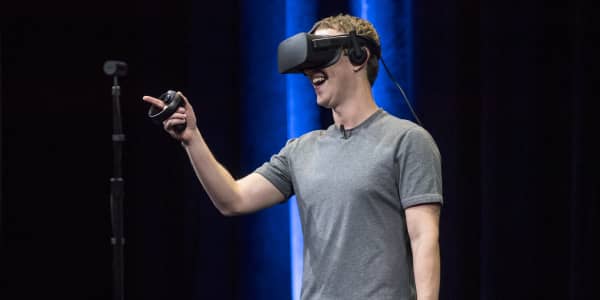When you stroll through MetaWorld, a future of simulated living seems imminently plausible.
Strap on a virtual reality headset and you can walk across a vast terrain next to a friend, who is actually thousands of miles away, play chess, sit by the campfire or pick a mushroom and eat it.
The developer of MetaWorld — HelloVR — describes it as a "10,000 square mile massively scaled open world." It's quite a technical feat.
All the random interactions have to be understood in real time, which requires rapid data processing and analysis, not to mention overcoming bandwidth restraints.
HelloVR has gotten this far in 18 months with just three people.
How did they do it?
Dedric Reid, HelloVR's founder and CEO, attributes the accomplishment to Improbable, a London-based start-up that's spent the past four years creating the backbone for the virtual world.

Improbable's operating system called SpatialOS is a computing platform that runs across thousands of machines on Google's cloud. It's solved the hard physics problems associated with a persistent simulation, enabling developers to create games, evolving stories and other forms of entertainment.
"We can focus on design and creativity and experience, which is awesome for VR," said Reid, who previously worked at AltspaceVR, a virtual reality software company. "I don't have to think about what a server is doing."
Improbable is helping lay the groundwork for what's expected to be an explosion in augmented and virtual reality in the coming years. According to IDC, AR and VR will generate $162 billion in combined sales by 2020, a thrity-onefold increase from $5.2 billion in 2016.
Headsets from Facebook's Oculus, Sony, Samsung and Microsoft will account for a significant piece of that, with hardware representing more than half of total sales.
For Improbable, virtual reality is just the start.
Gaming and entertainment represent the first and most obvious application of its operating system. But Herman Narula, Improbable's co-founder and CEO, says SpatialOS can be a critical tool for all sorts of systems requiring sophisticated logistics.
Cities, transportation companies, and energy and telecommunications providers are all prospective users of Improbable's simulation technology. Urban planners and architects can build out near-real-life models and analyze what happens to traffic flows when a new building or neighborhood is constructed.
Add to that a fleet of autonomous vehicles that can be efficiently deployed and controlled.
"All the public attention on VR has focused on visual experiences and putting on a headset and being inside a digital space," said Narula, who started Improbable in 2012. "What's even more mind-blowing and is more of a turning point is going from being digitally immersed in an environment that's as complicated as a video game to being digitally immersed in something that is reality."
It's still very early days.
Improbable raised $20 million from venture firm Andreessen Horowitz in 2015. Venture investing in AR and VR peaked in the first quarter at $1.1 billion, mostly tied to Magic Leap, which raised $794 million, according to CB Insights. Start-ups raised $205 million in the second quarter, a 56 percent increase from a year earlier.
Chris Dixon, who led Andreessen Horowitz's investment in Improbable, has been tracking the VR market for years and backed Oculus in 2013. He recognized the challenge that Improbable was attacking and said he was shocked when he saw how close it was to a solution.
"It's very hard to write software that works across thousands of machines," Dixon said in an interview.
Existing video games like "World of Warcraft," even with highly advanced graphics, are limited by the virtual universe that's been created by the developers. Improbable designed SpatialOS so that people can create their own space and have individual experiences, with the technology adapting as life unfolds.
"You can scale the world up as big as you want, in theory," said Dixon.
HelloVR is rapidly adding features to MetaWorld and preparing to release an early access version to consumers in March for use on Oculus and HTC devices. About 30,000 people have joined during the testing phase to work out the kinks and provide feedback.
Reid envisions a digital place where people can go to catch fish, hike and explore the outdoors or create art. It's a space that can be enjoyed with friends or alone, for fun or reflection.
"We want people to have memorable encounters rather than goofing off on the internet," Reid said. "You can imagine getting lost in it and not caring that no one's around."
More from Tech Drivers:
Amazon rolls out another policy that has sellers on edge
Why Cher loves emojis
Like Uber...but for a live orchestra in your home





